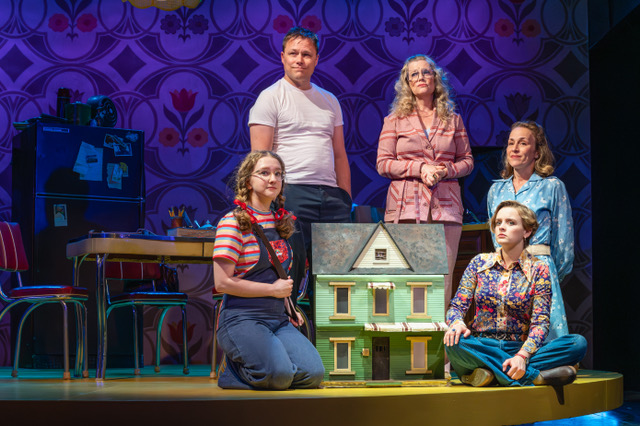Thoughtful Memory Play Runs through July 16

Remember the way things used to be? Like in 1973, a mere half-century ago. That’s where Incident at Our Lady of Perpetual Help transports us, mixing nostalgia with timeless lessons about the folly and disservice of parental stereotypes, and the abuse of power by the powers that be, a role that, in this case, is portrayed by organized religion.
Before a word is spoken in this Penguin Rep production (playing through July 16 in Stony Point, Rockland County, N.Y.), the set design instantly informs us what we’re about to witness harks to a bygone era.
As the synopsis says, it is the age of “bell bottoms, cassette tapes and landline phones” and, yes, people even wrote letters in longhand and smoked like chimneys (even after the cigarette cancer warning label was issued).
WOMEN’S LIB
It also is the time of the women’s liberation movement, a signal inflection point in American society that informs what playwright Katie Forgette has wrought.
There before us, on stage, in this lower-middle-class household, are the red plastic dining table chairs with tube metal frames, the faux-leather lounge chair, the jumbo-tulip-pattern wallpaper that looms over everything like an all-seeing presence. And there is a heck of a lot to see in this family’s travails. We are at the home of the O’Sheas, of proud Irish Catholic stock, who are fearfully faithful to the demands of their parish as well as to their heritage. We hear more than once invocation of the potato famine as a bitter, life-threatening lesson in the strength gained through suffering.
MEMORY PLAY
Our guide is ebullient, independent-minded 19-year-old Linda O’Shea (played by Abby Burris), who tells us this is a memory play, “which means a lot of it is false.” Who cares about accuracy if there’s enough entertainment to be had in the telling, and there’s enough fast-paced diversion here to make its running time feel shorter than it is, a credit to veteran director Thomas Caruso.
Our teenage narrator wears stylish bell-bottoms (a nod to the suburban hippie affect of the day) and is jazzed about attending graduate school at brainy Stanford University on a scholarship. Linda has designs on becoming a writer along with (unseen) boyfriend Buzz, whose hairiness is a running joke that – like the relentless classic movie references – is colorful and playful and threatens to wear itself out. (And I love classic movies of the 1940s forward.)
THE FAMILY O’SHEA The remaining characters are indelibly drawn and sharply acted, so that, by the play’s end, we feel like we know them well. There’s Linda’s hard-working, gruff father Mike (Mat Hostetler), tireless homemaker and church stalwart mom, Jo (Jennifer Blood), sassy one-woman Greek chorus of an aunt, Terri (Kellie Overbey), and little sis, Becky (Gabriella Cila), whose alter ego is a film noir detective in the mold of Humphrey Bogart. Get a load of this 13-year-old’s rakish fedora and tent-size trench coat, and her sidekick tape recorder, which gets her family into trouble with the self-righteous parish priest and obnoxious parishioner Betty Heckenbach (both played by Mat Hostetler quite convincingly). Judging by her tell-tale sharp tongue, Betty’s favorite entertainer no doubt was insult comic Don Rickles.
EXPLORING FAMILY LIFE
The play’s storyline, such as it is, involves Linda taking on the big-sister assignment of filling in Becky about the facts of life. But that conceit really is a rather slender thread in the service of Forgette exploring the role of organized religion in family life and the role of family life in shaping the future adult into which young people grow.
Allowing for the humorous moments that writer Forgette works to extract from this slice-of-life portrait of a 1970s family who come together to protect one of their own – and their own community standing – in the end the dramatic subtext makes “Incident at Our Lady of Perpetual Help” more dramedy than comedy. The denouement here – in the form of an epilog describing the future course of each family member – is true-to-life in a way that the typical Hollywood comedy or even drama is not.
PRACTICE VS PREACH
As paterfamilias of the O’Shea clan, Mike is used by Forgette to score points about the hypocrisy of a certain kind of clergy who preach the lessons of the Good Book out of one side of their lectern while practicing a dissonant set of values in their personal lives.
When Mike comments on Father Lovett’s prized Cadillac (he also has a hi-fi and color TV), it is less with envy than with disdain. (Yes, Virginia, in the early 1970s color TVs were still a semi-luxury, not yet owned by almost half the U.S.)
As materfamilias, Jo O’Shea is the saint of the flock. The generation gap between her and Linda is inflected by her daughter’s allegiance to the women’s lib movement. It was the era of ERA (Equal Rights Amendment) and Betty Friedan’s NOW (National Organization of Women), forging a divisive national conversation about the legacy male-female compact, where man is the hunter-gatherer and protector and woman is the everything-else-her. “Wives be subject to your own husbands,” quotes the priest from the Bible, “as to the Lord.” Linda, meanwhile, is eager to write for Gloria Steinem’s Ms. Magazine.
There’s a lot going on in “Incident at Our Lady of Perpetual Help, and it is handled with impressive flair and stagecraft by the cast and creative and technical teams.
Christopher Fleming is Scenic Designer; Vanessa Leuck is Costume Designer; Pamela Kupper is Lighting Designer;, Joel Abbott Sound Designer; Bobbie Zlotnik is Wigs); Buffy Cardoza is Property Designer); Michael Palmer is Production Stage Manager.
PenguinRep.org; 845-786-2873
